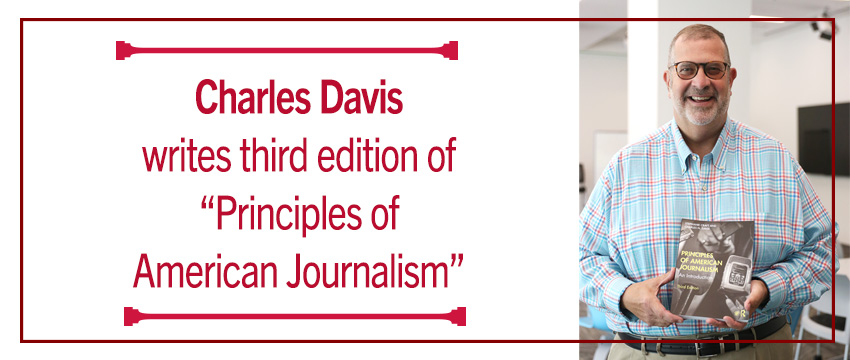Davis writes new edition of ‘Principles of American Journalism’

Davis writes new edition of ‘Principles of American Journalism’
Charles N. Davis (MA ’92), dean of Grady College, has written a third edition of “Principles of American Journalism,” an introductory text about the core values of journalism and its role in democracy.
The book is co-authored by Stephanie Craft, professor and head of the Department of Journalism at the University of Illinois, who co-taught a course by the same name at the University of Missouri for 14 years with Davis.
“Journalism is a distinct and disciplined practice that is differentiated from all other forms of communication,” Davis said. “This book is meant to be a primer on what journalism is and what it is not.”
“Principles of American Journalism” includes discussions on definitions and terms, values, economics, emerging media business models, a look at media ethics and law and the link between journalism and democracy.
“While there are timeless principles in journalism like verification, transparency and independence that never change,” Davis said, “there are also other parts of the industry including business ventures, media start-ups and economic changes that are constantly evolving. The third edition of the book updates those parts that are rapidly changing.”
Many of the edits began in 2020 and include examples of journalism covering the pandemic, the 2020 presidential election and social unrest. Journalism was key in keeping people updated during a challenging time and a goal of the new edition is to show the importance of journalism in today’s society.
“We are tying journalism to democracy in the era we are in,” Davis continues. “We are starving journalism at our peril. We are seeing an endangered state of the industry and we cannot be content to give up and rely on the internet for our news. That’s why it’s so important to understand the fundamentals and core values of journalism that are discussed in this book.”
Davis finds it rewarding that so many doctoral students who assisted with the lecture classes at Missouri have now adopted this text to use in classes they now lead as journalism professors.
“It’s a labor of love for us both,” he said. “We continue to do it because it’s a great way to stay current, but mostly for our former students. We have a huge network of doctoral students out there using the book.”
In addition to the text, there are discussion topics and exercises at the end of each chapter. “Principles of American Journalism” also has a companion website that includes resources for students and professors including flashcards, quizzes and links to cited websites.